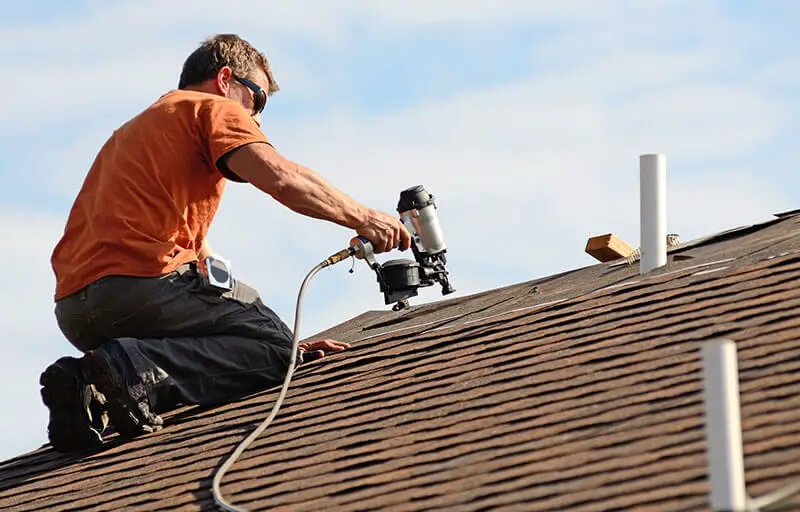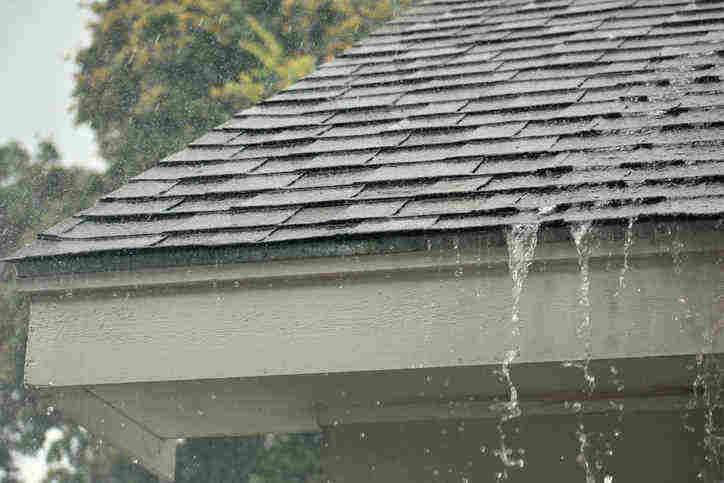As you have landed here, you are maybe in an emergency. But I request you to take a breath for a moment and read this blog. I swear you won’t regret it.
Yes, Roofers work in the rain. But this information is not enough to hire a roofer at this moment. You must know how roofers work in the rain. Does the roofer you hire have the ability and safety system to work in such a situation?
It’s crucial for efficient and safe roofing work. So, learn about the safe and efficient roofing process in the rain. Thus, you can judge whether your roofer has that ability or not.
Quick Jump
Comparing roofing work: regular days vs. rainy days

Roofing on normal days and roofing on rainy days have a huge difference. It’s, in general, a risky job. In the rain, it becomes even more dangerous. The risk of falling, dropping, or stumbling increases these days. It’s because of a lack of grip.
The roof gets slippery when there is rain. Thus the risk of falls increases. Another problem with rain is that it makes your roof wet. Therefore, roofing work becomes inefficient, and the quality of work drops.
However, roofers use essential safety equipment like ropes, harness systems, or safety nets. But they will need additional equipment or tools to work safely and efficiently in the rain. I am gonna talk about that in this post.
How do roofers work in the rain?
A rainy day is the most unsuitable condition for a roof installation. I highly discourage it in monsoon. But roof leakage and damage frequently appear in this season. So, you must hire a roofer for the repair job. Again your roofer will face some difficulties. But he can overcome them with a few steps. Let me explain.
Problems of roofing in the rain

The primary concern of roofing in the rain is its challenging work environment. It leads to poor work quality and increases the risk of accidents or injuries. Here is how.
- Challenging working environment: The primary problem of rain is that it complicates the roofing work. Consistent wind and raindrops through the eyes make it difficult to concentrate. Hands get wet and slippery. So, holding and handling the tools and materials become difficult. Igniting the welding machine is also impossible in the rain.
- Poor quality of work: Due to low grip and lack of concentration, drilling quality gets poor. Adhesive or concrete doesn’t stick. Materials get wet or even damaged when it rains. Because of these reasons, the overall quality of work becomes poor.
- Risk of fall: Due to moisture, the grip becomes low in rainfall. As a result, the risk of falling or stumbling increases. It can lead the roofer to serious accidents and injuries. Not only that. Roofer has to move too attentively when the grip is low. It slows down the movement of the roofer. Thus his efficiency also decreases.
Solutions
It seems impossible to do roofing work in the rain. But it’s possible if your roofing company ensures the following measures.
- Right roofing material: The effect of rain won’t damage the roofing material if it’s made of the right element. For example, metallic roofing material has water-resistant properties. Rain has no or less effect on this type of material.
- Water-resistant equipment: It can sound silly. But some common water-resistant equipment can help in this situation. For example, a clear tarp can protect the roofer and your property. If the roofer spreads the tarp above his head, he can save himself from raindrops. He can even ignite the welding machine for a short span. Besides, a tarp can cover the working area when the roofer is not working. Thus, you can protect your property from damage.
- Roofers safety: Basic roofers’ safety measures like a safety net or harness system are crucial in any weather. But, some additional measures like special shoes or waterproof clothing should also be taken in the rain. Waterproof clothing and a cap can help the roofer to protect his body and eyes from raindrops. Thus roofing work becomes a bit easier. However, the roofer’s shoes should have a better grip so he doesn’t slip most often.
Frequently asked questions about roofing in the rain
Can heavy rain cause roof leaks?
Yes, heavy rain can cause roof leaks. You may use good roofing material or maintain the roof well. But, it will eventually damage if it frequently faces heavy rain. Thus, roof leaks typically appear in the monsoon.
What happens if it rains when installing a roof?
When it rains, it starts damaging the roofing material. Also, water penetrates inside your house and damages your property. Reputed roofing companies don’t install a roof in the rain. Whether rain starts before installation or middle of it, they stop working and reschedule the work.
How long does it take a roof to dry after rain?
Generally, it takes 12 to 48 hours for a roof to dry after rain. But it depends on the weather. If there is decent sunlight the roof will dry within 24 hours. The duration can be even shorter if the roof has a good water extraction facility.
Conclusion
I assume both roofers and house owners are reading my blog. I have described the problem of roofing in the rain and its solutions. I hope this information will help both roofers and house owners.
Though you are a newbie roofer, you have no choice of avoiding your work. Whatever the condition is, you must do it. So, I suggest joining a company that facilitates safety measures for rainy days. It will also improve your mindset to work better and satisfy your client.
As a house owner, you should also ensure the roofer’s safety. It’s not just about social responsibility or ethics. It also affects the quality of service. So, make sure your roofing company ensures the roofer’s safety.
That’s all for today.
Cheers!
Related Topics:

Roger Lewis is an experienced roof repair contractor with over 15 years of industry experience. He is known for his expertise in all aspects of roof repair, including leak detection, shingle replacement, and gutter repair.
